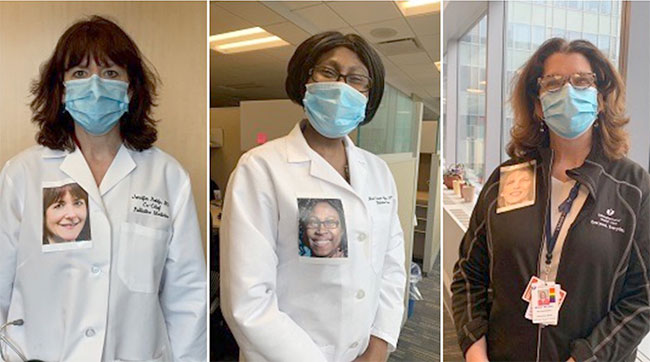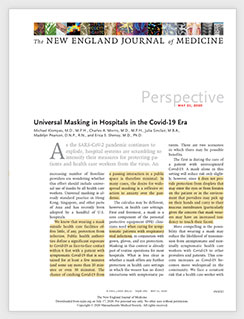New England Journal of Medicine: Wearing A Mask Outside Healthcare Facilities Offers Little, If Any Protectoin from Infection
Editor's Note: The FACTS explained below have been well known from the very beginning of this SCAMDEMIC, this massive fraud being perpetrated against us all. We have lunatic and/or totally ignorant politicians who are acting out of "their own mindless fears or worse, purely political motivations," and corrupt conflicted people and institutions like the WHO, CDC, Fauci, Gates, etc., LYING TO YOU ALL TO KEEP YOU IN CONSTANT FEAR to coerce you into complying with their Draconian nonsense about the need to wear masks all the time!! The only people that you need to be concerned about spreading a coronavirus are people who are displaying symptoms! You DO NOT NEED TO BE WORRIED ABOUT PEOPLE WHO ARE NOT SICK! And people who are not sick should not be wearing face masks all the time.

Universal Masking in Hospitals in the Covid-19 Era
New England Journal of Medicine
By:
- Michael Klompas, M.D., M.P.H.,
- Charles A. Morris, M.D., M.P.H.,
- Julia Sinclair, M.B.A.,
- Madelyn Pearson, D.N.P., R.N.,
- and Erica S. Shenoy, M.D., Ph.D.
As the SARS-CoV-2 pandemic continues to explode, hospital systems are scrambling to intensify their measures for protecting patients and health care workers from the virus. An increasing number of frontline providers are wondering whether this effort should include universal use of masks by all health care workers. Universal masking is already standard practice in Hong Kong, Singapore, and other parts of Asia and has recently been adopted by a handful of U.S. hospitals.
We know that wearing a mask outside health care facilities offers little, if any, protection from infection. Public health authorities define a significant exposure to Covid-19 as face-to-face contact within 6 feet with a patient with symptomatic Covid-19 that is sustained for at least a few minutes (and some say more than 10 minutes or even 30 minutes). The chance of catching Covid-19 from a passing interaction in a public space is therefore minimal. In many cases, the desire for widespread masking is a reflexive reaction to anxiety over the pandemic.
The calculus may be different, however, in health care settings. First and foremost, a mask is a core component of the personal protective equipment (PPE) clinicians need when caring for symptomatic patients with respiratory viral infections, in conjunction with gown, gloves, and eye protection. Masking in this context is already part of routine operations for most hospitals. What is less clear is whether a mask offers any further protection in health care settings in which the wearer has no direct interactions with symptomatic patients. There are two scenarios in which there may be possible benefits.
The first is during the care of a patient with unrecognized Covid-19. A mask alone in this setting will reduce risk only slightly, however, since it does not provide protection from droplets that may enter the eyes or from fomites on the patient or in the environment that providers may pick up on their hands and carry to their mucous membranes (particularly given the concern that mask wearers may have an increased tendency to touch their faces).
More compelling is the possibility that wearing a mask may reduce the likelihood of transmission from asymptomatic and minimally symptomatic health care workers with Covid-19 to other providers and patients. This concern increases as Covid-19 becomes more widespread in the community. We face a constant risk that a health care worker with early infection may bring the virus into our facilities and transmit it to others. Transmission from people with asymptomatic infection has been well documented, although it is unclear to what extent such transmission contributes to the overall spread of infection.1-3
More insidious may be the health care worker who comes to work with mild and ambiguous symptoms, such as fatigue or muscle aches, or a scratchy throat and mild nasal congestion, that they attribute to working long hours or stress or seasonal allergies, rather than recognizing that they may have early or mild Covid-19. In our hospitals, we have already seen a number of instances in which staff members either came to work well but developed symptoms of Covid-19 partway through their shifts or worked with mild and ambiguous symptoms that were subsequently diagnosed as Covid-19. These cases have led to large numbers of our patients and staff members being exposed to the virus and a handful of potentially linked infections in health care workers. Masking all providers might limit transmission from these sources by stopping asymptomatic and minimally symptomatic health care workers from spreading virus-laden oral and nasal droplets.
What is clear, however, is that universal masking alone is not a panacea. A mask will not protect providers caring for a patient with active Covid-19 if it’s not accompanied by meticulous hand hygiene, eye protection, gloves, and a gown. A mask alone will not prevent health care workers with early Covid-19 from contaminating their hands and spreading the virus to patients and colleagues. Focusing on universal masking alone may, paradoxically, lead to more transmission of Covid-19 if it diverts attention from implementing more fundamental infection-control measures.
Such measures include vigorous screening of all patients coming to a facility for symptoms of Covid-19 and immediately getting them masked and into a room; early implementation of contact and droplet precautions, including eye protection, for all symptomatic patients and erring on the side of caution when in doubt; rescreening all admitted patients daily for signs and symptoms of Covid-19 in case an infection was incubating on admission or they were exposed to the virus in the hospital; having a low threshold for testing patients with even mild symptoms potentially attributable to a viral respiratory infection (this includes patients with pneumonia, given that a third or more of pneumonias are caused by viruses rather than bacteria); requiring employees to attest that they have no symptoms before starting work each day; being attentive to physical distancing between staff members in all settings (including potentially neglected settings such as elevators, hospital shuttle buses, clinical rounds, and work rooms); restricting and screening visitors; and increasing the frequency and reliability of hand hygiene.
The extent of marginal benefit of universal masking over and above these foundational measures is debatable. It depends on the prevalence of health care workers with asymptomatic and minimally symptomatic infections as well as the relative contribution of this population to the spread of infection. It is informative, in this regard, that the prevalence of Covid-19 among asymptomatic evacuees from Wuhan during the height of the epidemic there was only 1 to 3%.4,5 Modelers assessing the spread of infection in Wuhan have noted the importance of undiagnosed infections in fueling the spread of Covid-19 while also acknowledging that the transmission risk from this population is likely to be lower than the risk of spread from symptomatic patients.3 And then the potential benefits of universal masking need to be balanced against the future risk of running out of masks and thereby exposing clinicians to the much greater risk of caring for symptomatic patients without a mask. Providing each health care worker with one mask per day for extended use, however, may paradoxically improve inventory control by reducing one-time uses and facilitating centralized workflows for allocating masks without risk assessments at the individual-employee level.
There may be additional benefits to broad masking policies that extend beyond their technical contribution to reducing pathogen transmission. Masks are visible reminders of an otherwise invisible yet widely prevalent pathogen and may remind people of the importance of social distancing and other infection-control measures.
It is also clear that masks serve symbolic roles. Masks are not only tools, they are also talismans that may help increase health care workers’ perceived sense of safety, well-being, and trust in their hospitals. Although such reactions may not be strictly logical, we are all subject to fear and anxiety, especially during times of crisis. One might argue that fear and anxiety are better countered with data and education than with a marginally beneficial mask, particularly in light of the worldwide mask shortage, but it is difficult to get clinicians to hear this message in the heat of the current crisis. Expanded masking protocols’ greatest contribution may be to reduce the transmission of anxiety, over and above whatever role they may play in reducing transmission of Covid-19. The potential value of universal masking in giving health care workers the confidence to absorb and implement the more foundational infection-prevention practices described above may be its greatest contribution.
Click on image to download PDF of the original article.


















